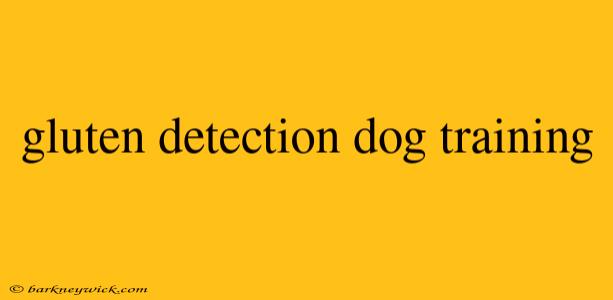The Nose Knows: Training Your Dog to Detect Gluten
Imagine this: You're at a restaurant, excited to enjoy a meal, but you have to meticulously check every ingredient, every dish, for the dreaded gluten. It's a familiar struggle for millions who live with celiac disease or gluten sensitivity. But what if there was a way to make this process easier, faster, and less stressful? Enter the world of gluten detection dogs.
My personal experience: I remember the first time I met a gluten detection dog. I was at a conference for celiac awareness, and a handler demonstrated the dog's abilities. It was fascinating to watch as the dog, with its keen sense of smell, sniffed out gluten-containing foods with remarkable accuracy. It sparked a curiosity in me - how do they do it?
The science behind it: Gluten detection dogs are trained to recognize the specific scent of gluten, a protein found in wheat, barley, and rye. Dogs have an incredible sense of smell – up to 100,000 times stronger than humans – making them ideal candidates for this task. They can detect minute traces of gluten, even in seemingly gluten-free foods where cross-contamination might occur.
Training for success: The training process involves positive reinforcement methods, similar to training any other service dog. The dog is first introduced to gluten-containing samples, and then rewarded with treats and praise for identifying them. They then progress to detecting gluten in various situations, like at restaurants, grocery stores, or even in your own home.
A real-life hero: Charlie is one such gluten detection dog who has made a significant difference in the life of his handler, Sarah. Sarah, a celiac sufferer, struggled with constant anxiety and fear of cross-contamination. But Charlie, with his trusty nose, changed everything. He alerts Sarah to any trace of gluten, allowing her to eat with confidence and enjoy social outings without worry.
Beyond the detection: While their primary role is to detect gluten, these dogs can also bring emotional support to their handlers. They provide a sense of security and companionship, which is particularly important for those living with a chronic condition.
The future of gluten detection dogs: The field of gluten detection dogs is steadily growing, with more and more organizations and trainers offering these services. As awareness of celiac disease and gluten sensitivity increases, the demand for these dogs is likely to continue to grow.
Tips for finding a gluten detection dog: If you're considering getting a gluten detection dog, it's crucial to do your research and find a reputable trainer who uses ethical and humane training methods. You can also look for organizations specializing in service dog training and inquire about their gluten detection programs.
Living with celiac or gluten sensitivity is a challenge, but it doesn't have to be overwhelming. Gluten detection dogs offer a lifeline of safety, independence, and peace of mind. With their incredible noses and unwavering loyalty, they are truly the best companions a person with gluten sensitivity could ask for.
